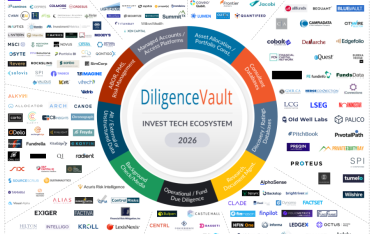The DiligenceVault team attended the 2025 ICI Investment Management Conference in San Diego, a key forum for compliance, legal, investment, operations, and technology professionals. Core themes included regulatory change, oversight pressures, and the practical integration of AI.
Regulatory Priorities and SEC Focus
As the industry navigates new technologies, product structures and changing demographics, the SEC is emphasizing flexibility, transparency, and stronger investor protections. Key areas of focus include:
- Disclosure Modernization: A speaker from the SEC emphasized improved disclosure practices for digital documents, including link accuracy and document accessibility.
- Investor Protection: Financial exploitation of senior investors remains a top SEC priority, with a focus on investor education and awareness as well as product suitability that meets the investor’s risk profile.
- Liquidity in Private Investments: The 15% cap on illiquid assets in open-end funds is under discussion due to challenges in meeting redemptions.
- Product Innovation and Oversight: The SEC highlighted its support for innovation (e.g., ETFs, mutual funds, alternatives), while maintaining investor protection.
- Operational Burdens: Firms raised implementation concerns around tagging, derivatives, and the Names Rule. The SEC is showing some flexibility but operational complexity remains.
Fund Board Governance Spotlight
Board Responsibilities: The evolving role of fund boards was a major theme at the conference, highlighting how boards are stepping up to meet the demands of a rapidly changing regulatory landscape and rapid product development.
-
- Continued focus and board involvement in product risk assessment, valuation, and liquidity monitoring.
- Establishment of compliance and AI oversight committees to address emerging risks.
- Emphasis on board succession planning, technology risk oversight, and clear communication practices.
CCO Relationships: Strong, independent relationships with CCOs – reinforced by regular executive sessions – are essential for effective oversight.
AI in Asset Management
The regulatory framework for AI in asset management is evolving while facing challenges in integrating AI to comply with compliance. While the Advisors Act provides some guidance, it lags behind European regulations. Areas of discussions include:
Early Adoption:
- Use cases include document review, data analysis, and streamlining due diligence workflows (e.g., questionnaires and certifications), and even speeding up creation of board materials.
- Firms are forming internal AI committees to explore applications and manage risks.
Governance and Policy:
- Clear internal policies are needed to define AI use and boundaries along with oversight, and careful management.
- Risk management priorities include cybersecurity, data privacy, and over-reliance on AI.
- Upskilling of staff is critical for responsible and effective use.
Productivity Gains:
- AI is being used to summarize research, draft memos, and review long-form documents more efficiently, but we are in the early days of assessing efficiency gains.
Regulatory Considerations:
- Firms are developing governance frameworks aligned with global regulation, ethical standards, and oversight of AI use by service providers and managers.
- Use of tools like Microsoft Copilot is being piloted in controlled environments.
- A risk-based approach is recommended, depending on how complex the use case is. The level of risk can change based on things like:- the type of information the AI uses (e.g., personal or confidential data),
– how the AI’s output is used, and
– whether any decisions exclusively rely on the AI’s results.
In short, the more sensitive the data and the more important the decisions, the more carefully you should manage the risks.
DEI and Governance Shifting Approach
In step with broader global discourse, the conference also touched on the shifting narrative around Diversity, Equity, and Inclusion (DEI) and board governance:
- DEI Remains a Priority: While the language has become less formal, firms continue to value DEI for its role in fostering diverse perspectives and stronger decision-making.
- Integrated, Not Isolated: DEI is increasingly embedded into broader talent and culture strategies, rather than treated as a standalone initiative.
The overall tone reflected a push for practical, balanced approaches that maintain DEI’s importance without overburdening governance frameworks.
Summary
Firms are facing increasing complexity across regulation, product innovation, and operational oversight. The conference highlighted the importance of staying adaptive, using AI thoughtfully, and strengthening governance frameworks.
To explore how DiligenceVault supports oversight and subadvisor due diligence including preparing board governance materials, get in touch for a live demo.
Additional resources available to DiligenceVault clients which are referenced in the above takeaways:



